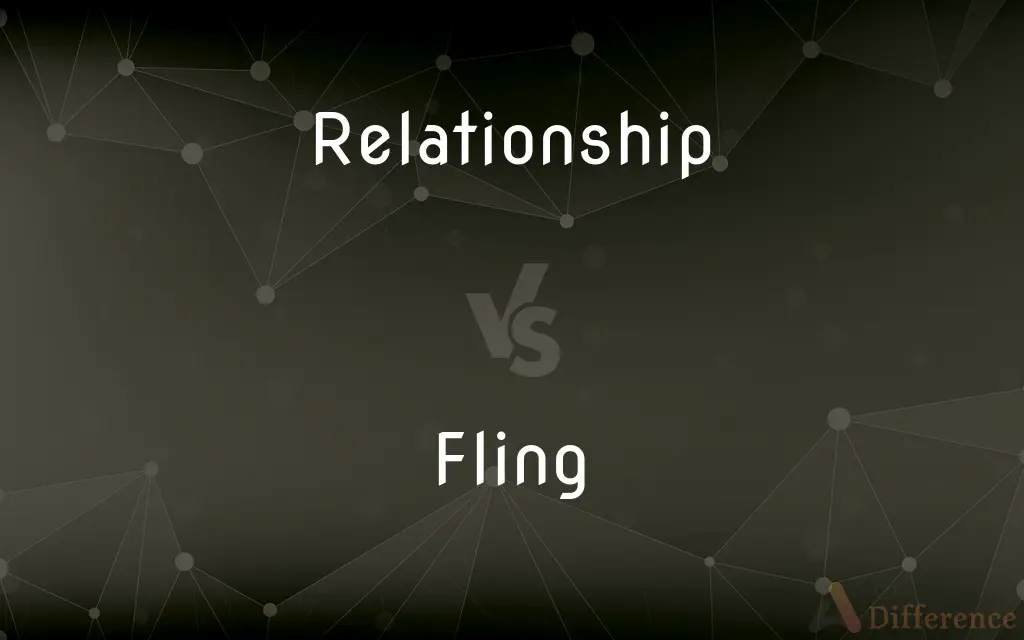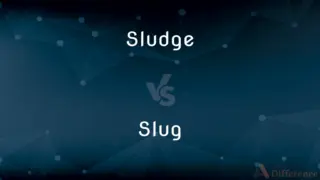Relationship vs. Fling — What's the Difference?
By Fiza Rafique & Urooj Arif — Updated on March 19, 2024
A relationship typically implies a committed and long-term bond between partners, while a fling is often a short-term and casual liaison with no expectations of lasting commitment.

Difference Between Relationship and Fling
Table of Contents
ADVERTISEMENT
Key Differences
In the realm of human connections, a relationship is generally understood to be a long-term commitment between individuals, characterized by mutual respect, love, and shared goals. It often involves a deep emotional and sometimes legal bond, such as in marriage. On the other hand, a fling is usually a short-lived and non-serious encounter between people, where the primary focus is on physical attraction or temporary companionship without the expectation of developing a deeper or lasting connection.
While relationships are built on the foundation of communication, trust, and mutual understanding, aiming for longevity and stability, flings are more about immediate gratification and less about forming lasting bonds. Relationships require ongoing effort, compromise, and understanding from all parties involved, whereas flings might avoid such depths, being more centered around fun, excitement, and the present moment without much concern for the future.
The expectations and responsibilities that come with a relationship are significantly more substantial than those in a fling. Relationships involve planning for the future, meeting family, and integrating lives, which includes emotional support, financial partnership, and often cohabitation. Conversely, flings typically lack these elements, being more casual and with fewer expectations about the roles each person plays in the other's life.
Emotional investment distinguishes relationships from flings considerably. In a relationship, emotional vulnerability is not only expected but necessary for the bond to deepen and grow. Participants in a fling may deliberately avoid deep emotional connections to keep the liaison uncomplicated and free of expectations.
Despite these differences, both relationships and flings have their place in human social experiences. Each serves different needs and desires at various life stages. Relationships offer stability, depth, and companionship, catering to long-term emotional and psychological needs. Flings can provide excitement, a sense of freedom, and the opportunity to explore interpersonal dynamics without the pressure of commitment.
ADVERTISEMENT
Comparison Chart
Definition
A committed, long-term partnership between individuals, often involving emotional, and possibly legal bonds.
A short-term, casual liaison focused on physical attraction or temporary companionship without expectations of lasting commitment.
Duration
Long-term, with expectations of continuity and growth.
Short-term, often transient and without plans for the future.
Emotional Investment
High, involving deep emotional connections and vulnerability.
Low, with an emphasis on physical or surface-level connections.
Expectations and Responsibilities
Substantial, including mutual support, compromise, and planning for a joint future.
Minimal, focusing on enjoyment and avoiding deep emotional or logistical entanglements.
Purpose
To foster stability, companionship, and emotional fulfillment.
To enjoy immediate gratification, fun, and a carefree experience without the pressure of commitment.
Compare with Definitions
Relationship
A committed partnership based on mutual love and respect.
Their relationship has grown stronger over the years.
Fling
Avoids the complexities and responsibilities of a serious relationship.
After her long-term relationship ended, she wasn't ready for anything more than a fling.
Relationship
Often includes shared goals and plans for the future.
The couple's relationship is focused on building a life together.
Fling
Focuses on physical attraction or temporary companionship.
Their fling was intense but brief.
Relationship
Can involve legal commitments like marriage.
Their marriage marked the formalization of their relationship.
Fling
Offers excitement and freedom without the pressure of commitment.
His fling provided a carefree escape from routine.
Relationship
Requires ongoing effort and compromise.
They work hard to maintain a healthy relationship.
Fling
Lacks deep emotional investment or long-term plans.
They both knew their fling wouldn't lead to a serious relationship.
Relationship
Involves deep emotional connections and support.
They share a relationship built on trust and understanding.
Fling
A short-term and casual romantic liaison.
She had a summer fling while vacationing in Greece.
Relationship
The condition or fact of being related; connection or association.
Fling
Throw or hurl forcefully
I was flung into jail
He picked up the debris and flung it away
She flung herself down on his bed
Relationship
A particular type of connection existing between people related to or having dealings with each other
Has a close relationship with his siblings.
Fling
A short period of enjoyment or wild behaviour
One final fling before a tranquil retirement
Relationship
Connection or association; the condition of being related.
Fling
Short for Highland fling
Relationship
(mathematics) The links between the x-values and y-values of ordered pairs of numbers especially coordinates.
Fling
To throw with violence
Flung the dish against the wall.
Relationship
A way in which two or more people behave and are involved with each other
I have a good working relationship with my boss.
Fling
To put or send suddenly or unexpectedly
Troops that were flung into battle.
Relationship
(music) The level or degree of affinity between keys, chords and tones.
Fling
To engage (oneself) in an activity with abandon and energy.
Relationship
The state of being related by kindred, affinity, or other alliance.
Fling
To cast aside; discard
Fling propriety away.
Relationship
A relation between people; (`relationship' is often used where `relation' would serve, as in `the relationship between inflation and unemployment', but the preferred usage of `relationship' is for human relations or states of relatedness);
The relationship between mothers and their children
Fling
To move quickly, violently, or impulsively
He flung out of the room.
Relationship
A state of connectedness between people (especially an emotional connection);
He didn't want his wife to know of the relationship
Fling
The act of flinging.
Relationship
A state involving mutual dealings between people or parties or countries
Fling
A brief period of indulging one's impulses.
Fling
(Informal) A usually brief attempt or effort
You take a fling at it.
Fling
An act of throwing, often violently.
Fling
An act of moving the limbs or body with violent movements, especially in a dance.
The fling of a horse
Fling
An act or period of unrestrained indulgence.
Fling
(figuratively) An attempt, a try (as in "give it a fling").
Fling
(obsolete) A severe or contemptuous remark; an expression of sarcastic scorn; a gibe or taunt.
Fling
A lively Scottish country dance.
The Highland fling
Fling
(obsolete) A trifling matter; an object of contempt.
Fling
To move (oneself) abruptly or violently; to rush or dash.
Fling
(transitive) To throw with violence or quick movement; to hurl.
Fling
To throw; to wince; to flounce.
Fling
To utter abusive language; to sneer.
The scold began to flout and fling.
Fling
To cast, send, to throw from the hand; to hurl; to dart; to emit with violence as if thrown from the hand; as, to fing a stone into the pond.
'T is Fate that flings the dice: and, as she flings,Of kings makes peasants, and of peasants kings.
He . . . like Jove, his lighting flung.
I know thy generous temper well.Fling but the appearance of dishonor on it,It straight takes fire.
Fling
To shed forth; to emit; to scatter.
The sun begins to flingHis flaring beams.
Every beam new transient colors flings.
Fling
To throw; to hurl; to throw off or down; to prostrate; hence, to baffle; to defeat; as, to fling a party in litigation.
His horse started, flung him, and fell upon him.
Cromwell, I charge thee, fling away ambition.
This question so flung down before the guests, . . . Was handed over by consent of allTo me who had not spoken.
Fling
To throw; to wince; to flounce; as, the horse began to kick and fling.
Fling
To cast in the teeth; to utter abusive language; to sneer; as, the scold began to flout and fling.
Fling
A cast from the hand; a throw; also, a flounce; a kick; as, the fling of a horse.
Fling
A severe or contemptuous remark; an expression of sarcastic scorn; a gibe; a sarcasm.
I, who love to have a fling,Both at senate house and king.
Fling
A kind of dance; as, the Highland fling.
Fling
A trifing matter; an object of contempt.
England were but a flingSave for the crooked stick and the gray goose wing.
Fling
A short period during which one indulges one's wishes, whims, or desires in an unrestrained manner.
Fling
A love affair.
Fling
A casual or brief attempt to accomplish something.
Fling
A period during which one tries a new activity; as, he took a fling at playing tennis.
Fling
A usually brief attempt;
He took a crack at it
I gave it a whirl
Fling
A brief indulgence of your impulses
Fling
The act of flinging
Fling
Throw with force or recklessness;
Fling the frisbee
Fling
Move in an abrupt or headlong manner;
He flung himself onto the sofa
Fling
Indulge oneself;
I splurged on a new TV
Fling
Throw or cast away;
Put away your worries
Common Curiosities
Can a fling turn into a relationship?
Yes, while not always common, flings can sometimes evolve into relationships if both parties develop deeper feelings and decide to commit to each other.
Are emotional connections important in a relationship?
Yes, emotional connections are crucial in a relationship, providing the foundation for trust, mutual understanding, and long-term bonding.
What is the main difference between a relationship and a fling?
The main difference lies in the level of commitment and emotional investment, with relationships being long-term and deeply connected, while flings are casual and short-lived.
Is it possible to have a healthy relationship without legal commitments?
Absolutely, many healthy and committed relationships exist without legal formalities like marriage, based on mutual respect, love, and shared life goals.
Can the emotional depth of a relationship be replicated in a fling?
Generally, flings lack the emotional depth and vulnerability found in relationships, as they are characterized by their casual and temporary nature.
What role does communication play in relationships and flings?
Communication is essential in relationships for resolving conflicts and deepening connections, while it may be less emphasized in flings, focusing more on surface-level interactions.
Why do people engage in flings?
People may engage in flings for various reasons, including the desire for physical intimacy, the thrill of a new connection, or the freedom from commitment and responsibilities.
How do expectations differ between a relationship and a fling?
In a relationship, there are higher expectations regarding emotional support, future planning, and mutual responsibilities, whereas flings carry minimal expectations beyond immediate enjoyment.
How do personal values influence preferences for relationships versus flings?
Individual values and life stages significantly influence whether someone prefers the stability and depth of a relationship or the freedom and simplicity of a fling.
What impact do relationships and flings have on personal growth?
Both can impact personal growth, with relationships often prompting deeper self-understanding and emotional maturity, while flings can offer insights into desires and boundaries.
Is it necessary to define a connection as either a relationship or a fling?
While not always necessary, defining the nature of a connection can help manage expectations and ensure that both parties have aligned goals and understandings.
Are there societal perceptions that differentiate relationships from flings?
Yes, societal perceptions often view relationships as more serious and valuable, while flings may be seen as less significant or even frivolous.
Can societal or cultural norms influence the dynamics of relationships and flings?
Yes, cultural and societal norms can significantly influence how relationships and flings are perceived, experienced, and conducted.
How do life stages affect preferences for relationships or flings?
Preferences can vary with life stages, with younger individuals possibly favoring the casualness of flings and those at a later stage seeking the companionship and stability of relationships.
Share Your Discovery

Previous Comparison
Sludge vs. Slug
Next Comparison
Orthodox vs. UnorthodoxAuthor Spotlight
Written by
Fiza RafiqueFiza Rafique is a skilled content writer at AskDifference.com, where she meticulously refines and enhances written pieces. Drawing from her vast editorial expertise, Fiza ensures clarity, accuracy, and precision in every article. Passionate about language, she continually seeks to elevate the quality of content for readers worldwide.
Co-written by
Urooj ArifUrooj is a skilled content writer at Ask Difference, known for her exceptional ability to simplify complex topics into engaging and informative content. With a passion for research and a flair for clear, concise writing, she consistently delivers articles that resonate with our diverse audience.
















































